- Home
- Francine Mathews
Death in a Cold Hard Light Page 14
Death in a Cold Hard Light Read online
Page 14
“Tea,” she said. “Decaf.”
She was sitting in the middle of the front seat, legs straddling the gearshift, between Will and his stepfather. Will leaned around her to shake Rafe’s hand, with that strange male formality, as though he and his dad were strangers on an elevator. She had never seen Will kiss anybody—other than a peck on his mother’s cheek—and she wondered, suddenly, whether he ever had.
“Tell Tess I’ll be home by midnight,” he told his stepfather. “I’ll walk. It’s only a couple of blocks.”
“And how will Jorie get home?”
“It’s okay,” she said quickly. “I’ll call my mom.”
“Look,” Rafe said reasonably, “I’ll walk home right now, and well leave the truck parked here. After the party, Will can drop you at your house, Jorie, and save your mom the trip. Easier every way around.”
Jorie glanced at Will. His dark blue eyes looked wary.
“What about Paul?” he asked her. “Aren’t you seeing him later?”
“I’m never seeing Paul again,” she said distinctly.
“Okay, then.” Rafe handed Will the keys and opened the car door. “Try to be back by one, buddy.”
“I will, Dad.” The boy’s words were for his father, but he was looking at Jorie.
She drew the collar of Will’s jacket close to her throat. “Don’t ask me now,” she said. “I want to be happy for a while.”
Will flashed his fleeting smile. “Then let’s go.”
Chapter Fifteen
By the time Merry arrived home Saturday evening, she was sick to death of the subject of Jay Santorski. She had talked to people for hours, with that blend of official interrogation and sympathetic shop designed to elicit the fullest response—or so she hoped. She wanted to lie on her couch and watch a movie, with Chinese food for company; but Peter would have flown in the food from Hyannis, and picked it up at the airport, and that much effort was beyond her. She considered calling the dangerous Margot St. John—Sue Morningstar had given Merry the girl’s number—and then decided against it. There was a limit to how many questions even she could ask in one day.
As she made her way back toward the station, Merry saw that the end-of-the-year darkness had fallen as completely as a blindfold over Nantucket town. Main Street was closed to traffic during Christmas Stroll, and despite the penetrating cold, a desultory crowd moved purposefully along its cobblestoned length. Lights shone out from frosted shop windows and crimson ribbon twined along the horsehead hitching posts. The chorus of a Christmas carol drifted to Merry’s ears as she stood before her car, keys in hand. The sights and the sounds made her feel unutterably lonely. Abruptly she stuffed the keys back in her purse and left the car behind on Chestnut Street. Tonight she would walk, and try to forget drowned scallopers and their destructive habits. Tonight she would have her own Christmas Stroll, Peter or no Peter.
She started at Nantucket Looms, with a lingering survey of their braided rag rugs, the color of pomegranates and eggplant, the color of the sea. They had gone in this year for selling wool—and with a sense of surprise, Merry saw the calligraphed placard propped in front of the bins. Island Merino from Mason Farms. Had Peter told her he was selling wool to the store?
Had Peter told her much of anything, lately? Or had she simply stopped paying attention?
John Folger sat with his back to the warm glow of 21 Federal’s fireplace. The bar was alive with faces—elegant, vividly happy—and a buzz of laughter and clashing cutlery drowned the voices in his head. He glanced sideways at a well-dressed foursome drinking Scotch under one of the restaurant’s handsome oil paintings—a racing yacht, keeled-over, with all its flags flying. They were off-islanders come for Christmas Stroll, and privileged in holding reservations for one of Nantucket’s best tables. The two women were bottled blondes with ropy gold chains at their necks and well-manicured hands, so similar they might have been sisters. They gazed with artificial adoration into the eyes of their men, who had adopted the daring mode of banded-collar shirts under their Armani jackets.
Well-being circulated among the four like an expensive scent. John turned away and took another swig of his beer.
He had watched the waitstaff pace through the changes of the lunch crowd, the late afternoon aperitif drinkers, and now the dinner surge. He had been sitting at the bar all afternoon, nursing a succession of microbrews. He was not drunk—he never allowed himself to be drunk, particularly in uniform—but he was profoundly miserable.
He could not see his way clear. He could not go back. And so he waited, like a man with a terminal disease, for other hands to decide his fate. If he could remain in the warm glow that lived here between the fireplace and the sage-colored walls, all destiny suspended—
“Like another, Chief?”
Tommie the bartender, his expression inscrutable. He had succeeded the day barman—Alonzo Madeira—whose careful dark eyes had betrayed even less. Off-islanders meant little to John Folger, particularly at this time of year; but people like Tommie mattered. They would wonder why he had drunk away the afternoon, and they would begin to talk. There would be a tidal wave of talk breaking over his head in a matter of days; he knew that now.
He had been a fool to involve Meredith. Dirty work should be handled alone.
“I’m worried about Dad, Ralph.”
“It’s Saturday night, Meredith Abiah, and Christmas Stroll into the bargain. It’s high time your father had a little fun. John’s old enough to find his way home.”
“That’s not what I meant. But where is he, anyway?” Merry sliced a hunk of Jarlsberg and laid it on a cracker. Despite the Mayhew House’s ample oysters, she was ravenous again. Once she had quit the gaiety of Main Street, her feet had carried her instinctively to her grandfather’s house. Ralph Waldo had poured her some Harvey’s, put a match to the fire, and listened without comment while she stumbled through an account of her day.
“I believe your father has asked a lady of his acquaintance to dine,” he said now, and settled himself in his favorite chair.
“No way.” The cracker halted in midair, three inches from Merry’s open mouth. “Dad’s on a date?”
“Don’t look so appalled.”
“I’m not! Really. I’m pleased. Who is she?”
“Someone he met during that computer course he took at the high school last summer.”
“And it’s taken him this long to ask her out?”
Ralph Waldo regarded her sardonically. “It took him five years to ask your mother to marry him, my dear. John was never a precipitate human being.”
“No,” Merry mused, and sipped her sherry. “Which is why I’m worried. He called me back from Connecticut as though a bomb were about to explode, Ralph—and now, every time I want to talk to him, he’s unavailable. It’s just not like Dad. He’s acting—cagey. As though he’s hiding something.”
Her grandfather reached for a tray table resting near her chair and pulled it toward him. A variety of arcane objects were arranged on the rectangular surface, and his aged hands moved among them fondly. “Hiding something. About the young man who dabbled in heroin?”
“And about Matt Bailey. Bailey’s office has been thoroughly cleaned out, Ralph. It’s like the guy never existed. Dad has to know something—” She stopped abruptly, her eyes on the torpedo-shaped wooden mold around which her grandfather was methodically weaving strips of cane. “Is that a lightship basket you’re making?”
“It is, Meredith. And if success anoints my efforts—you shall have it for a wedding gift.”
“Where did you learn to do that?”
“Another course,” he said briefly, “in September. You’ve learned very little about the habits of the Folger men since moving a few blocks away, Meredith. We do not allow ourselves to stand still. We stride forward, toward the twenty-first century.”
“With a babe and a basket under each arm. I suppose Emily Teasdale roped you into this?”
Emily Teasdale, librarian emerita of th
e Nantucket Atheneum, was the friend of Ralph Waldo Folger’s twilight years, as he himself might have put it. She was also, to Merry’s infinite regret and rage, the grandmother of Roxie Teasdale, a young schoolteacher brutally murdered the previous spring.
“I owe Emily many things, but not my interest in lightship baskets,” Ralph replied with dignity. “I came to them entirely on my own. When you reach the age of eighty-five, Meredith, and are still blessedly in command of your wits, you cast about for honorable work. Particularly of a winter evening. I ruled out needlepoint and pornography, not to mention chess with the Wharf Rats, and settled instead on this. Lightship baskets are so peculiar to Nantucket—and in their origins, so peculiar to men, who first devised them—that it seems a man might do worse with his idle hours than to fashion a thing of beauty.”
“You have to teach me someday.”
“Tell me what’s troubling you about the scalloper’s death,” he said, looking up from the fan of canes.
“Nobody who knew him seems to think he was a drug user.”
“That’s not so very unusual.”
“It is in a small town like this. Somebody should have noticed. And then there’s the problem of Matt Bailey.”
Ralph Waldo’s right eyebrow shot skyward. “I thought your father told you not to worry about him.”
“That’s why I am.”
“I see.”
“Ralph, why would Dad be lying to me?”
If she had expected him to protest and reassure her, Ralph Waldo was destined to disappoint. “Is he lying to you, then?”
“I think he must be. Or, at the very least, withholding information. He insists Bailey’s absence is unconnected to Santorski’s death. But I just found a connection today. The kid died with a matchbook in his pocket that had Bailey’s phone number on it.”
“Ah,” her grandfather said comprehendingly, and continued weaving. “Does John know?”
“If he does, I’m the last person he’ll tell,” Merry shot back bitterly.
Ralph pursed his lips. “And you’re wondering why.”
“Shouldn’t I? Have you ever heard of bringing a detective onto a case, and then stonewalling her?”
“Repeatedly. It’s common practice in some large urban areas, I believe.”
“But not here. Not between Dad and me.”
“Merry,” Ralph said patiently, “imagine for a moment that John is not your father. Consider his behavior purely from the standpoint of a police investigation. Why would he withhold certain information from you?” Her grandfather’s fingers came to rest on the wide wooden drum of the basket mold, as though he were cradling an infant. “So as not to prejudice your findings, perhaps.”
“Or because he doesn’t trust me to handle the truth,” she retorted.
Ralph dismissed this with a wave. “His calling you home from Connecticut should put paid to that fear. Your father trusts you more than anyone else on the force, Meredith Abiah, whether he tells you so or not. You dwell far too much on the mistakes in your past, my dear, and far too little on the successes. Which are considerable.”
Merry was silent for several minutes, her eyes on the fire declining in the grate. Ralph Waldo’s fingers recommenced their difficult work, and the wind howled around the eaves of the Tattle Court house.
“Let’s say, for the sake of argument,” she persisted, “that Matt Bailey was running an undercover drug sting operation. And that his agent was Jay Santorski. What if their cover was blown? And their target was a particularly nasty individual, dealing in heroin? Santorski’s death, apparently by overdose—which may have been administered against his will, while his wrists and ankles were bound—suddenly makes sense. So does Bailey’s disappearance. Matt’s scared to death, and on the run.”
“I thought you people had sworn off drug operations for a while,” Ralph said, his eyes suddenly grave.
“So did I.” Merry let all that was unspoken hang in the air between them. “Maybe that’s why Dad doesn’t want to talk about it.”
For years, the Nantucket force had prided itself on undercover work like Fred McIlhenney’s. However successful last year’s bust, it was in general a perilous and volatile game, with success dependent upon two things: the worth of the agent planted in the drug dealer’s midst, and the secrecy enshrouding the operation.
Like McIlhenney, Bailey had run an undercover op or two—the most recent ending in failure the previous winter. Bailey lacked McIlhenney’s flair for discretion. He was also plagued with what he called bad luck, and Merry privately considered bad judgment. Bailey had been careless and blown his agent’s cover; and the agent himself, in a desperate bid to shore up his target’s confidence, had started snorting cocaine with abandon. By Valentine’s Day, the agent was in detox and the target had fled to Mexico.
John Folger had not been pleased. Neither was the DA, Dan Peterson. And he had very nearly aborted McIlhenney’s operation, although Bailey knew nothing about it and could hardly have jeopardized Joey Figuera, whose true identity was more closely guarded than Salman Rushdie’s home address. McIlhenney had objected, and pled the case for calm—and in the end, he’d busted Marty Johansen.
Bailey, however, was relieved of all drug-enforcement duties.
In theory
“I didn’t think Dad could be rash enough to let Bailey handle something dangerous again,” Merry said.
“You don’t know for a fact that he did,” Ralph pointed out. “You don’t even have the results of the autopsy. Young Jay might have died for entirely innocent reasons.”
“With needle marks on his arm and Bailey’s phone number in his pocket. I don’t like it, Ralph.”
The Santorski drowning was beginning to look like a classic Bailey screwup. Jay’s profile fit the working one for undercover agents. The young man had appeared at random on the Nantucket scene, and worked his way almost immediately into a circle known for its drug use. He had taken a minimally paid laborer’s job on a scallop boat, and another part-time at a local restaurant, much as Joey Figuera had done. He had hung out at the typical places that islanders frequented, struck up conversations, asked questions, and looked for some action.
And he had Bailey’s phone number in his pocket.
Had they met periodically in the darkness of the moors, Jay edgy and troubled, Bailey his usual overconfident and deeply stupid self? Had Bailey tried to control Jay’s growing affection for Margot St. John, or told him to spy on his new friends, or equipped him with a voiceactivated tape recorder and microcassettes, like the one presently hanging from a fishing line in Clarence Strangerfield’s office?
Merry set down her sherry glass with ringing finality. “I understand what you mean, Ralph. If Santorski died completely by accident, Dad would see no reason to mention that he was on the police payroll. Why risk the negative exposure? Not to mention the DA’s outraged questions. So he decides to keep that crucial fact from me, and hopes I’ll declare the death a simple drowning. But I can’t be the neutral party he wants, Ralph. I keep finding facts that don’t fit the neat solution. I’m not sure that I want to, anyway.”
“What do you mean?”
“Say that Santorski did drown by accident. If he died with heroin in his veins, and he was working for Bailey in any capacity, the Nantucket force is morally responsible for his death. We can’t dodge that truth. His mother, at least, deserves better.”
“Wait for the autopsy report, Meredith,” her grandfather counseled gently.
“Dad hasn’t left me much choice, has he?”
“You okay?” Will asked Jorie.
She was sitting silently beside him in Rafe’s truck, the deep island darkness flowing around them. And something else was lingering there, between the seat and the dashboard—something Will felt in the very tips of his fingers. Anxiety. Nerves. Was Jorie afraid to be alone with him?
“Looks like it’s clearing,” he attempted. “Stars coming out behind the clouds.”
“I think Paul is using drugs
.” Jorie’s voice was very small, like a child’s.
“Paul’s always been using drugs,” Will said, more sourly than he had intended. There had been a time when he had liked Paul almost as much as Jorie; but that was years ago now, and Will was growing older. “Why do you think his dad threw him out of the house?”
“I mean real drugs.”
A chill rose along Will’s back. “Like—what, exactly, Jor?”
She shrugged, and looked out the car window “I don’t know. Heroin, maybe.”
It fell like a curse between them, harsh and ugly. “You’re kidding,” Will said, shock in his voice. Images of needles and hollow-eyed rock stars rose before his eyes. “Heroin? Where would Paul get heroin?”
“I don’t know,” she said again. “Hyannis, maybe? Or from his friends?”
“What friends? We’re his friends.”
“Used to be,” she said, turning now to look at him. “We used to be his friends. But he has others now. Paul isn’t interested in high school kids anymore.”
Will’s heartbeat accelerated. He drove around the Rotary and took the road to the airport, where Jorie and her mother lived. “Does that include you, Jor?” he asked her in a conversational tone.
“I guess it does.” She was trying not to cry.
“I’m sorry,” he said, and bit his lip. “He’s a total loser, Jorie—”
“What did you do with that needle, Will? The one you found today?”
He hesitated.
“You didn’t show it to your dad, did you?”
“You think it was Paul’s?”
“I don’t know! But what if it was? What if he threw it into the harbor, so nobody could find out? You saw how he put the rocks in the bag. He wanted that stuff to stay on the bottom.”
“Nobody’s going to know about Paul,” Will said, and reached across the gearshift for her hand.
Jorie gripped his fingers tightly, then let them go. “Tell me the truth, Will. Did you show it to your dad?”

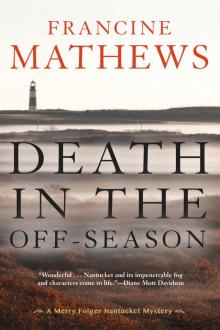 Death in the Off-Season
Death in the Off-Season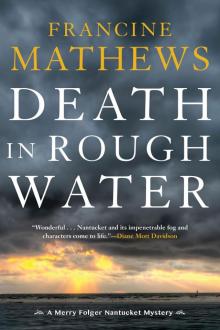 Death in Rough Water
Death in Rough Water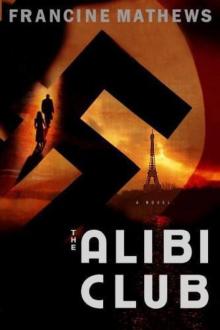 The Alibi Club
The Alibi Club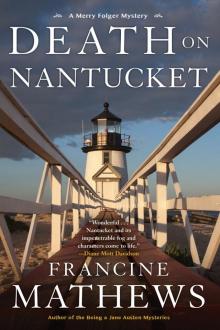 Death of a Wharf Rat
Death of a Wharf Rat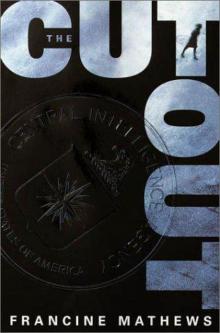 The Cutout
The Cutout The Secret Agent
The Secret Agent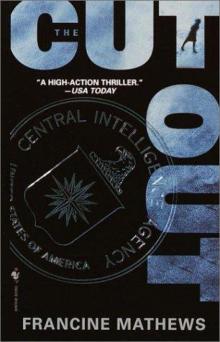 The Cutout cc-1
The Cutout cc-1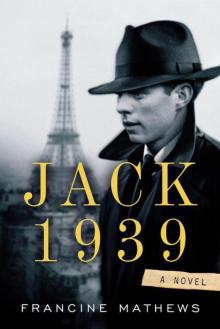 Jack 1939
Jack 1939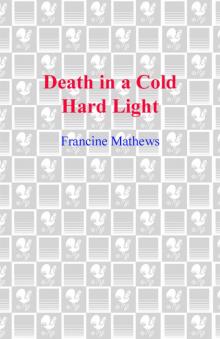 Death in a Cold Hard Light
Death in a Cold Hard Light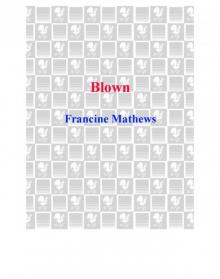 Blown
Blown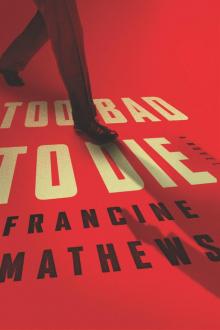 Too Bad to Die
Too Bad to Die